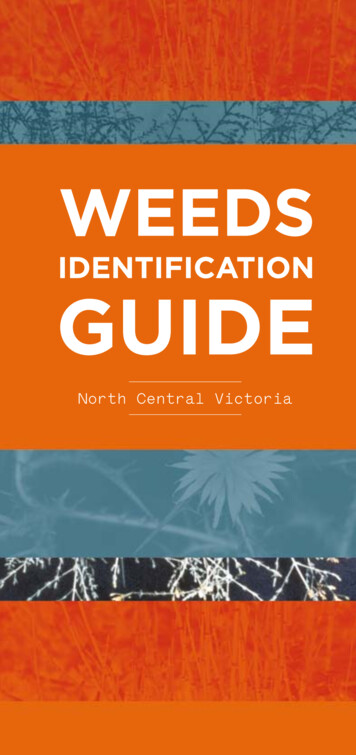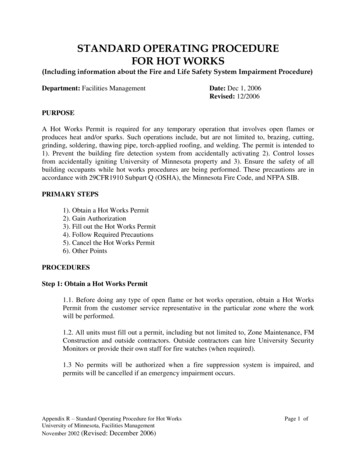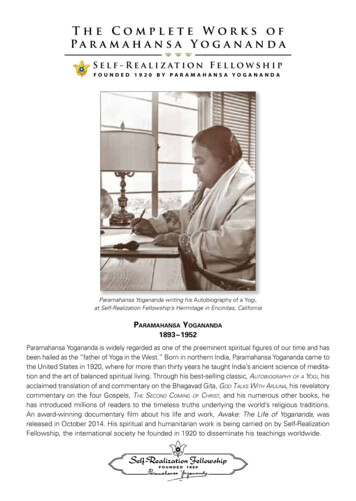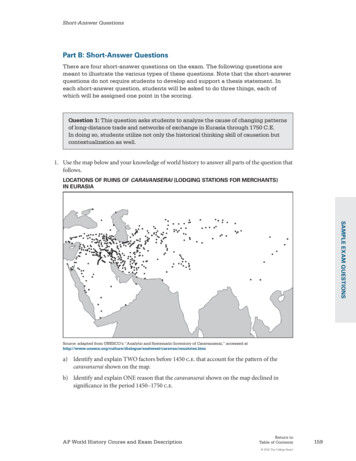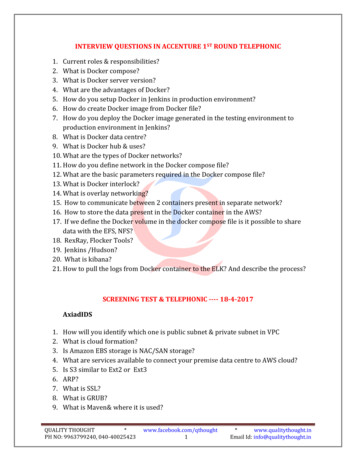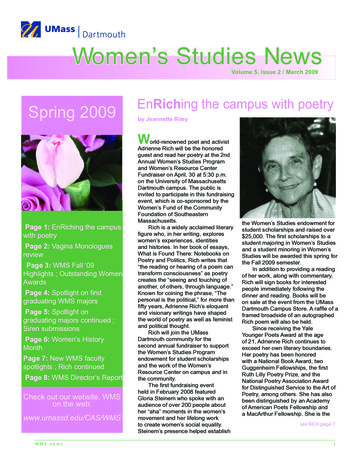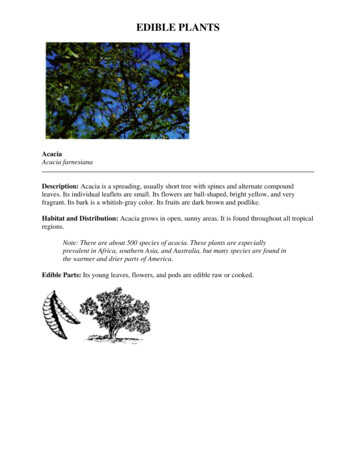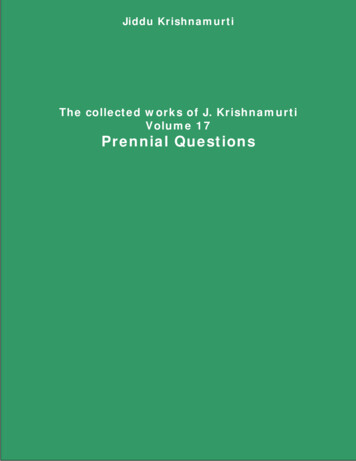
Transcription
Jiddu KrishnamurtiThe collected works of J. KrishnamurtiVolume 17Prennial Questions
Table Of Content- New York 1966 - .41st Public Talk .42nd Public Talk.183rd Public Talk .324th Public Talk.445th Public Talk 5th.596th Public Talk.72- Ojai 1966 - .881st Public Talk .882nd Public Talk.1013rd Public Talk .1144th Public Talk.1265th Public Talk.1406th Public Talk.154- New Delhi 1966 -.1651st Public Talk .1652nd Public Talk.1773rd Public Talk .1944th Public Talk.213- Madras 1967 - .2331st Public Talk .2332nd Public Talk.2453rd Public Talk .2584th Public Talk.270- Bombay 1967 - .2821st Public Talk .2822nd Public Talk.2963rd Public Talk .3094th Public Talk.322- Rishi Valley 1967 -.3361st Talk To Students .3361st Public Talk .3452nd Public Talk.3573rd Public Talk .369- New Delhi 1967 -.3841st Public Talk .3842nd Public Talk.3963rd Public Talk .4114th Public Talk.4245th Public Talk.439- Varanasi 1967 - .4531st Talk To Students .4532
2nd Talk To Students.4703rd Talk To Students .4863
- New York 1966 1st Public Talk26th September 1966It is always rather difficult to communicate. Words must be used, and eachword has a certain definite meaning, but we should bear in mind that the word isnot the thing; the word does not convey the total significance. If we semanticallystick to words, then I'm afraid that we shall not be able to proceed much further.To communicate really deeply needs not only attention, but also a certain qualityof affection - which doesn't mean that we must accept what is said or that wemust not be critical. We must not only be alert intellectually, but we must avoidthe pitfall of words. To really communicate with another about anything, thereshould also be a certain quality of direct affection, a certain quality of exchange,with full capacity to investigate, to examine. Then only can communication takeplace. Perhaps there will be a communication with each other here, because weare going to deal with many subjects, many problems during these talks. We aregoing to go into them fairly deeply. To understand what the speaker is saying,there must be a certain quality of attention in listening.Very few of us listen, because we ourselves have so many ideas, so manyopinions, so many conclusions and beliefs, which actually prevent the act oflistening. To listen to another is one of the most difficult things to do. We are soready with our own opinions, our own conclusions. We are likely to interpret,agreeing or disagreeing, taking sides, or saying, "I don't agree", and quicklybrushing aside what is being said. All that, it seems to me, prevents the act ofactually listening. Only when there is a listening which is not merely intellectual isit possible to commune with each other. Any clever person can listen to a certainargument, to a certain exposition of ideas; but to listen with the mind and theheart, with one's total being requires a great deal of attention. To attend implies4
not only knowing one's own beliefs, concepts, conclusions, what one wants, andso on, but also putting those aside for the time being, and listening.We have to talk over a great many things, because life has so many problems;we are all so confused. Very few have any belief in anything, or faith. There iswar; there is insecurity, great anxiety, fear, despair, the agony of daily existence,and the utter boredom and loneliness of it. Beyond all this are the problems ofdeath and love. We are caught in this tremendous confusion. We mustunderstand the totality of it, not the fragment which is very clear, which we wantto achieve; not the special conclusion which we think is right, or an opinion, or abelief. We must take the whole content of existence, the whole history of man: hissuffering, his loneliness, his anxiety, the utter hopelessness, meaninglessness oflife. If we can do that, not take any particular fragment which may for the timebeing appeal to us or give us pleasure, but rather as it were see the whole map,not partially, not fragmentarily, then perhaps we shall be able to bring about aradical revolution in the psyche. That's the main crisis of our life, though there arevast changes going on in the world of science, of mathematics and all the rest.Technologically there is tremendous change going on; but in the psyche of thehuman being there is very little change. The crisis is not in the outwardtechnological advancement, but rather in the way we think, the way we live andthe way we feel. That is where a revolution must take place. This revolutioncannot be according to any particular pattern, because no revolution,psychologically, is possible if there is merely the imitation of a particular ideology.To me, all ideologies are idiotic; they have no meaning. What has meaning iswhat is, not what should be. And to understand what is, there must be freedom tolook, not only outwardly, but also inwardly. Really there is no division as the outerand the inner. It's a process, a unitary movement; and the moment weunderstand the outer, we are also understanding the inner. Unfortunately wehave divided, broken up life into fragments: the outer, the inner; the good and thebad; and so on. As we have divided the world into nationalities, with all their5
miseries and wars, we have also divided our own existence into inward andoutward. I think that is the worst thing we can do: break up our existence intovarious fragments. That's where contradiction lies, and most of us are caught inthis contradiction, and hence in conflict.With all the complications, the confusions, the misery, the enormous humaneffort that has gone to build a society which is getting more and more complex, isit possible, living in this world, to be totally free of all confusion, and therefore ofall contradiction, and hence to be free of fear? A mind that is afraid obviously hasno peace. Only when the mind is completely and totally free of fear can itobserve, can it investigate.One of our major problems is violence, not only outwardly, but also inwardly.Violence is not merely physical violence, but the whole structure of the psyche isbased on violence. This constant effort, this constant adjustment to a pattern, theconstant pursuit of pleasure and therefore the avoidance of anything which givespain, discarding the capacity to look, to observe what is all these are part ofviolence. Aggression, competition, the constant comparison between what is andwhat should be, imitation all are surely forms of violence. Because man, sincehistorical times, has chosen war as a way of life, our daily existence is a war, inourselves as well as outwardly. We are always in conflict with ourselves and withothers. Is it possible for the mind to be totally free of this violence? We needpeace, outwardly as well as inwardly, and peace is not possible if there is notfreedom, freedom from this total aggressive attitude toward life.We all know that there is violence, that there is tremendous hate in the world,war, destruction, competition, each one pursuing his own particular form ofpleasure. All that is a way of life which breeds contradiction and violence. Weknow this intellectually; we have thought about it; statistically we can examine it;intellectually we can rationalize the whole thing, and say, "Well, that's inevitable;that is the history of man for the last two million years and more, and we'll go on6
that way". Is it possible to bring about a total revolution in the psyche, in oneself not as an individual? The individual is the local entity: the American, the Indian,the Russian. He can do very little. But we are not local entities. We are humanbeings. There is no barrier as an Indian, an American, a Russian, a communistand so on, if we regard the whole process of existence as that of a human being,which you and I are, and if we can bring about a revolution there, not in theindividual. After all if you go beyond nationalities, the absurdities of organizedreligion, and superficial culture, as human beings we all suffer; we go throughtortures of anxiety. There is sorrow; there is the everlasting search for the good,the noble and what is generally called God. We are all afraid. If we can bringabout a change in the human psyche, then the individual will act quite differently.This implies that there is no division between the conscious and the unconscious.I know it is the fashion to study a great deal about the unconscious. Really thereis no such thing. We'll discuss all this later. I'm just outlining what we are going totalk over together during the next five talks.Is it possible for the human being to totally empty the past, so that he is madenew and looks at life entirely differently? What we call the unconscious, whether itis fifty years past or two million years past, the racial residue, the tradition, themotives, the hidden pursuits, the pleasures, all this is not the unconscious. It isalways in the consciousness. There is only consciousness, although you may notbe aware of the total content of that consciousness. All consciousness islimitation, and we are caught in it. We move in this consciousness from one fieldto another field, calling them by different names; but it is still the conscious. Thegame we play, as the unconscious, the conscious, the past, the future and all therest is within that field. If we are very aware of our own process of thinking,feeling, acting, we can observe for ourselves how we deceive ourselves, movefrom one field, from one corner to another. This consciousness is always limited,because in this consciousness there is always the observer. Wherever there is7
the observer, the censor, the watcher, he creates limitation within thatconsciousness.Any change or revolution brought about by will, by pleasure, by an avoidanceor an escape, by pressure, by strain, by convenience is still within that limit, withinthat consciousness and therefore it is always limited, always breeding conflict. Ifwe observe this, not through books, not through psychologists and analysts, butactually, factually as it takes place in ourselves as human beings, then thequestion will inevitably arise whether it is possible to be conscious where it isnecessary to be conscious, going to the office and similar activities, and to befree of it where consciousness is a limitation. It is not that we go into a trance oramnesia, or some mystical nonsense; but unless there is freedom from thisenclosing consciousness, this time-binding consciousness, we shall not havepeace. Peace is not dependent on politicians, on the army; they have too muchvested interest. It is not dependent on the priests, nor on any belief. All religions,except one or two perhaps, Buddhism and Hinduism, have always talked peaceand entered into war. That's the way of our lives. I feel that if there is no freedomfrom this limitation of consciousness as time-binding, with its observer at theenter, man will go on endlessly suffering.Is it possible to empty the whole of consciousness, the whole of the mind, withall its tricks and vanities, its deceptions, pursuits and moralities, and all that,based essentially on pleasure? Is it possible to be totally free of it all, to empty themind so that it can look and act and live totally differently? I say that it is possible,but not out of vanity or some superstitious, mystical nonsense. It is possible onlywhen there is a realization that the observer, the centre is the observed.It requires a great deal of understanding to come to this. It isn't a matter ofyour sentimentally agreeing or disagreeing. Do you know what understandingmeans? Surely, understanding is not intellectual, not saying, "I understand yourwords, the meaning of your words." That's not understanding, nor is it an8
emotional agreement, a sentimental affair. There is understanding of anyproblem, of any issue, when the mind is totally quiet, not induced quietness, notdisciplined quietness, but when the mind is completely still. Then there isunderstanding. Actually this takes place when we have a problem of any kind. Wehave thought a great deal about it; investigated, examined back and forth, andthere is no answer. We more or less push it aside, and the mind becomes quietwith regard to that problem. Suddenly we have an answer. This happens to manypeople; it is nothing unusual. Understanding can only come when there is directperception, not a reasoned conclusion.Our question then is: how is a man, a human being - not American, notEnglish, nor Chinese - how is a human being to create a new society? He canonly create that when there is a total revolution in himself as a human being whenhe has no fear at all, because he understands the nature of fear, what thestructure of fear is, and the meaning of fear. He comes directly into contact with it,not as a thing to be avoided, but as a thing to be understood. Is that possible? Isit possible to understand the whole structure of thought, which is alwaysfunctioning round a centre? Is it possible to understand the whole machinery ofthinking, which is the result of memory, since thought is the reaction of memory,and hence the limitation of consciousness? Is it possible to totally not think, tototally function without memory as it now functions.This brings us to a point: what is the function of idea, idea being the prototype,the formula, the ideal, the concept. Has it any function at all? For us idea is veryimportant, and we act, we function on idea, on concepts, on formulas. A belief isa formula. All our activity is from ideas, or based on ideas, and hence there is acontradiction between act and the idea. I have an idea, an ideal, a belief, and Iact according to that, or approximate my action to that. Action can never be theidea. The idea is unreal; the action is real. The idea of a nation, the idea of acertain dogma, such as belief in God, and all other ideas are purely ideological. Isit possible to act without the idea?9
Please, this requires a great deal of inquiry, because as long as there isconflict in any form, there must be pain and sorrow, and there must be conflictjust as long as there is contradiction. The nature of contradiction is essentially theidea and the fact, the what is. If there is no idea at all, no belief, no dogma, notomorrow, which is always the ideal, then I can look at what is actually; nottranslate it in terms of tomorrow, but see actually what is. To understand what is,one need not have ideas. All that one has to do is to observe. That brings us tothe next point, which is: what is observing? What is seeing? I wonder if we eversee, observe, or do we see with the word, with a conclusion, with a name, andtherefore they become barriers to seeing? If you say, "Well, he's an Indian fromIndia with all his mystical ideas, or romantic ideas", and so on, you're not actuallyseeing. It is only possible to see when thought doesn't function. If you arelistening, expecting something, I don't know what, the expectation is preventingyou from listening; the idea, the concept, the knowledge prevents you fromobserving. If you look at a flower, a tree, a cloud, or a bird, whatever it is,immediately your reaction is to give it a name; you like it or dislike it; you havecategorized it, put it away as a memory, and you have stopped looking.Is it possible to look, to see, without all the mentation taking place? Mentationis always thought as an idea, as memory; and there is no direct perception. I donot know if you have observed your friend, your wife or your husband, justlooking. You look at another or listen to another with all the memories ofmisfortunes, insults, and all the rest. You actually are not listening or seeing. Thisprocess of non-observance is called relationship. (Laughter) please don't laugh itaway, because all this is very serious. This isn't a philosophical lecture which youlisten to, and then go home and carry on. Only to the very serious man is thereliving, is there life. One cannot, with all this appalling confusion, misery, just laughit away, or go to a cinema and forget all about the beastly stuff. It requiresextraordinary, earnest, attentive seriousness, and seriousness is not a reaction.All reactions are limitations, but when one observes, listens, looks, one begins to10
understand whether it is at all possible for man to be totally free of hisconditioning. We are all conditioned: by the food, the clothes, the climate, theculture, the society in which we live. Is it possible to be free of that conditioning,not in some distant future, but on the instant? That's why I asked whether it ispossible to free the mind totally, empty it completely, so that it is something new.If this does not take place, we are committed to sorrow; we are committed toeverlasting fear.Is it possible to free the mind of the past, totally, and if it is, how can oneempty it? In certain fields past knowledge is essential. One must know where oneis going. One can't forget and put aside all the technological knowledge whichman has acquired through centuries, but I am talking about the psyche, whichhas accumulated so many concepts, ideas, experiences, and is caught within thisconsciousness with the observer as its centre.Having put this question, what is the answer? It is the right question, not anirrelevant question. When one puts the right question, there is the right answer;but it requires a great deal of integrity to put the right question. We have put theright question: is it possible for man, who has lived for so many centuries andmillions of years, who has pursued a path of violence, who has accepted war as away of life, in daily life as well as on the battlefield, who is everlastingly seekingpeace and denying it - is it possible for man to transform himself completely, sothat he lives totally differently?Having put the question, who will answer it? Will you look to someone toanswer it, some guru, some priest, some psychologist, or are you waiting for thespeaker to answer it? If you put the question rightly, the answer is in the question,but very few of us have put that question. We have accepted the norm of life; andto change that requires a great deal of energy. We are committed to certaindogmas, certain beliefs, certain activities as the way of life. We are committed;and we are frightened to change it, not knowing what it will breed.11
Can we, realizing the implications of all this, can we honestly put thatquestion? Surely, how we put it matters also. We can put it, ask ourselvesintellectually, Out of curiosity, out of a moment which we can spare from the dailyroutine, but that will not answer it. What will answer that question depends on themind: how earnest it is, how lazy it is, or how indifferent to the whole structureand the misery of existence.Having put that question, we are going to find out. We are going to talk overtogether during these five more talks that are to come, how to discover theanswer for ourselves, not depending on anyone. There is no authority, there is noguru, no priest who will answer this; and to come to the point where we are notdependent on anyone psychologically is the first, and probably the last step.Then, when the mind has freed itself from all its diseases, it can find out if there isa reality which is not put together by thought; it can find out if there is such a thingas God. Man has searched, sought after, and hunted that being, and we have toanswer that question. Also we have to answer the question of what death is. Asociety, a human being that does not understand what death is will not know whatlife is, nor what love is. Merely to accept or deny something which is not ofthought is rather immature, but if we would go into it, we must lay the foundationof virtue, which has nothing to do with social morality. We must understand thenature of pleasure, not deny pleasure or accept pleasure, but understand itsnature, its structure. And obviously there must be freedom from fear, and hence amind that is completely free from discontent and wanting more experience. Thenonly, it seems to me, is it possible to find out if there is something beyond thehuman fear which has created God.Questioner: Would you please repeat that very important question, the wayyou asked it?Krishnamurti: I'm afraid I couldn't do that, could I? That means going all over itagain. I will perhaps another day.12
Questioner: What is the state of the mind, body and brain which is energy, thestate in which self is not? Krishnamurti: It is very easy to ask questions, but whois going to answer them? Please do take seriously what I'm saying. Who is goingto answer? To put the right question demands a great deal of intelligence. I'm notsaying that you're not intelligent, but it requires a great deal of understanding. Ifyou ask a question to confirm your own ideas, if you're asking for confirmation,you're not really asking a question. If you're asking the question to clarify yourown confusion, will you ask a question, if you know you're confused? Becauseout of your confusion you may ask a question, and you will listen to the reply onlyaccording to your confusion; therefore it's not an answer. Or you ask a questionbecause you can't look, you can't understand and therefore you want someone'shelp. The moment you seek help from another psychologically, you're lost. Thenyou set up the whole structure of hierarchical thinking, the gurus, the priests, theanalysts and all that.To ask a right question is one of the most difficult things; and the moment youhave asked the right question, there is the answer - you don't have to ask it even.(Laughter.) No, please, this is really serious.Questioner: Are you setting as the goal of human experience thecontemplation of infinity and perfection?Krishnamurti: I'm afraid I'm not, sir. (Laughter.)Questioner: What do you mean when you talk about the mind being quiet, butnot an induced quiet?Krishnamurti: Sir, I can discipline the mind to be quiet, force it, control it,because I have an idea that the mind should be quiet, because out of thatquietness I hope to achieve something, or gain something, or realize somethingor experience something. All that is induced quietness; therefore it's sterile. Butquietness is something entirely different, which we can't go into now, because it13
requires a great deal of examination and understanding. That silence comesnaturally when there is understanding, when there is no effort.Questioner: What relation has the observer, my observer, to other observers,to other people?Krishnamurti: What do we mean by that word "relationship"? Are we everrelated to anyone, or is the relationship between two images which we havecreated about each other? I have an image about you and you have an imageabout me. I have an image about you as my wife or husband, or whatever it is,and you an image about me also. The relationship is between these two imagesand nothing else. To have relationship with another is only possible when there isno image. When I can look at you and you can look at me, without the image ofmemory, of insults and all the rest, then there is a relationship, but the very natureof the observer is the image, isn't it? My image observes your image, if it ispossible to observe it, and this is called relationship, but it is between two images,a relationship which is non-existent, because both are images. To be relatedmeans to be in contact. Contact must be something direct, not between twoimages. It requires a great deal of attention, an awareness, to look at anotherwithout the image which I have about that person, the image being my memoriesof that person, how he has insulted me, pleased me, given me pleasure, this orthat. Only when there are no images between the two is there a relationship.Questioner: Could you comment on the present use of LSD. Krishnamurti: Ah!(Laughter.)Questioner:.for creating that state of imageless relationship?Krishnamurti: LSD is the newest drug to produce certain effects. In ancientIndia there existed another of these drugs called Soma. The name doesn't matter.Man has tried everything to bring about right relationship between man and man:drugs, escapes, monasteries; dozens and dozens of ideals, which one hopes will14
unify man - the communist ideal, this ideal or that ideal. Now there is this drug.Can an outside agency bring about right relationship, which is imagelessrelationship? You know we have tried, not chemicals, but a belief as a drug.People in the West have had a belief in Christ, the Buddhists in the Buddha, andso on. They all hoped that their belief would bring people together, but it has not.On the contrary, by their exclusive belief they have created more mischief. As faras I'm concerned, no outside agency, such as a drug, can bring about rightrelationship. You cannot, through drugs, love another. If you could, theneverything would be solved. Why do we give much more importance to a drugthan to a belief, to a dogma, to the one Saviour who is going to bring rightrelationship? Why emphasize a drug or a belief? Both are detrimental to rightrelationship. What brings about right relationship is to be totally aware of all one'sactivities, one's tho
Jiddu Krishnamurti The collected works of J. Krishnamurti Volume 17 Prennial Questions. 2 Table Of Content . we observe this, not through books, not through psychologists and analysts, but actually, factually
